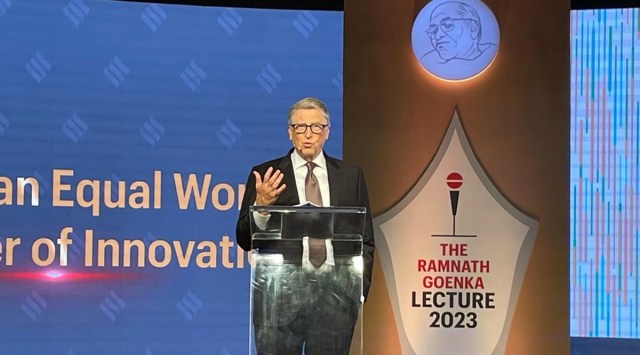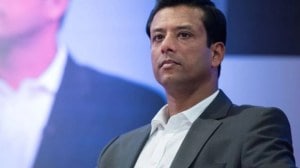The first 25 weeks of the Covid pandemic destroyed 25 years of progress in global health and three years later, most countries’ health systems are still not completely back on track, said Bill Gates Wednesday, adding that the pandemic “catalysed” a wave of health innovation in India.
With its record of vaccine development and digital public infrastructure platform, India has the potential to develop into a hub of “innovation and ingenuity,” to herald a “new era of global partnership” which can overcome the world’s greatest challenges, Gates said, delivering the Fifth Ramnath Goenka Memorial Lecture here.

Underlining the power of innovation to bridge divides and the role of India in the “big, global innovation boom,” Gates said: “When I was at Microsoft, we chose to put a development centre here in 1998. And we did that because we knew India was going to play a major role in the global innovation ecosystem – not just as a beneficiary of new breakthroughs, but as an innovator of them. In addition, as a scaler of breakthroughs. India can develop high-quality yet cost-effective innovations and drive their rapid adoption. Vaccines are a prime example.”
 This was the first Ramnath Goenka lecture after the pandemic.
This was the first Ramnath Goenka lecture after the pandemic.
When it comes to overcoming the world’s greatest challenges like climate change or healthcare, India has a significant role to play, Gates said, flagging the country’s low-cost innovations like the rotavirus vaccine that saved lives globally, and affordable solutions like making biofuels and fertilisers from waste to address climate change.
 The subject of the lecture was “Creating an Equal World: The Power of Innovation.” (Express Photo by Renuka Puri)
The subject of the lecture was “Creating an Equal World: The Power of Innovation.” (Express Photo by Renuka Puri)
The author, philanthropist, investor, technology founder, and co-chair and trustee of the Bill and Melinda Gates Foundation began his lecture by talking about a front-page article in The New York Times that talked about 3 million children dying of diarrhoea every year, 90% of whom were from developing countries. He said he had a list of concerns for his newborn daughter but diarrhoea was not among them. He spoke of India’s journey from there to a point where 83% of one-year-olds in the country receive the rotavirus vaccine, saving 200,000 lives each year.
 “Some of the focuses of our organisation are global health and inquities reduction,” said the Microsoft founder during the lecture. (Express Photo by Renuka Puri)
“Some of the focuses of our organisation are global health and inquities reduction,” said the Microsoft founder during the lecture. (Express Photo by Renuka Puri)
Gates said that although childhood immunisation levels were bouncing back to pre-pandemic levels in India, for many other countries it might take another three years to get back on track. He spoke about innovations during Covid-19 and India’s ability to develop cheaper kits and scale up testing.
Later, in a conversation with Anant Goenka, Executive Director, The Indian Express, on being asked about the balance between incentivising innovation and sharing of technology, Gates said that a “kind of ideal” solution does exist in the field. He said the return of investments for companies comes primarily from sales in rich countries, somewhat from middle income countries, and for the lower income countries, the price should be just what it costs to make the medicine. As for climate technologies, market competition and political processes “will kick in.”
Story continues below this ad
 Co-chair and trustee of the Bill and Melinda Gates Foundation, Bill Gates took the stage weeks after the release of his latest book: How to Prevent the Next Pandemic. (Express Photo by Renuka Puri)
Co-chair and trustee of the Bill and Melinda Gates Foundation, Bill Gates took the stage weeks after the release of his latest book: How to Prevent the Next Pandemic. (Express Photo by Renuka Puri)
He said that big pharma has done incredible innovations, bringing out new class of obesity drugs and continuing research for an Alzheimer’s drug, and so “I wouldn’t want to get rid of profit motive in medical innovation.”
 Bill Gates delivers the fifth Ramnath Goenka Memorial Lecture in New Delhi, Wednesday. (Express photpo by Renuka Puri)
Bill Gates delivers the fifth Ramnath Goenka Memorial Lecture in New Delhi, Wednesday. (Express photpo by Renuka Puri)
Speaking on the climate crisis, Gates said: “Most of the emissions come from the rich countries and yet most of the damage will be in middle income and lower income countries that are near the Equator. It’s an incredible injustice. And, even though it creeps up on you, we need to act now, we need to act in a very big way.”
One of the challenges though with climate change, Gates said, is the “green premium” that comes with products made without emitting greenhouse gases. He said: “If you try to buy jet fuel that’s green, it’s twice as expensive. If you want to buy cement without emission, it’s twice as expensive. Now someone could say that climate is important so let’s get somebody to write a cheque for that extra cost. But sadly that will be trillions of dollars a year. And, there just is no fund… even in the rich countries,” he said, adding that the climate crisis is an innovation challenge that shrinks the green premium.
Earlier, in his welcome address, Raj Kamal Jha, Chief Editor, The Indian Express, said that Gates brought “science and hope” to the enduring questions of the day. Quoting his remark that “Innovation is a hammer and I use it on every nail I see,” Jha said that the nails Gates saw – from education to public health — were “pegs for social change and expanded the common good.”
Story continues below this ad
 ‘How to Prevent the Next Pandemic’ is a veritable action plan – informed by technology and the latest in vaccine research — to anticipate and address the next health challenge. (Express Photo by Renuka Puri)
‘How to Prevent the Next Pandemic’ is a veritable action plan – informed by technology and the latest in vaccine research — to anticipate and address the next health challenge. (Express Photo by Renuka Puri)
This was the first Ramnath Goenka lecture after the pandemic. The lecture, named after the founder of The Indian Express, has been delivered by then RBI governor Raghuram Rajan; then President of India Pranab Mukherjee; then Chief Justice of India Ranjan Gogoi; and External Affairs Minister S Jaishankar.
On climate change, Gates said the challenge was innovation on a “massive scale,” to ensure that the world gets to net-zero emissions “without the penalty of higher prices for going green.”
 “As the founder of The Indian Express, Ramnath Goenka institued some of the highest standards of journalism in India,” noted Gates. (Express Photo by Tashi Tobgyal)
“As the founder of The Indian Express, Ramnath Goenka institued some of the highest standards of journalism in India,” noted Gates. (Express Photo by Tashi Tobgyal)
“It is an injustice that the people who have done the least to cause climate change are the ones suffering the most from it,” he said. “In my lifetime I’ve never been so optimistic about the potential for new technologies to improve the world,” he added.
Earlier in the day, Gates spoke about Aadhaar and India’s digital networks and payment systems, while hailing the country’s reliable and low-cost connectivity. He said this will be the world’s cheapest 5G market. He was speaking at a session on ‘Building resilient and inclusive economies – the Promise of Digital Public Infrastructure’ under India’s G20 presidency.
Story continues below this ad
 Raghuram Rajan, Pranab Mukherjee, Ranjan Gogoi and S Jaishankar delivered the lecture in previous years.(Express Photo by Tashi Tobgyal)
Raghuram Rajan, Pranab Mukherjee, Ranjan Gogoi and S Jaishankar delivered the lecture in previous years.(Express Photo by Tashi Tobgyal)
Gates also visited the Indian Agricultural Research Institute (IARI), and met Minister of State for Electronics and IT Rajeev Chandrasekhar.
 Gates said, “In my lifetime I’ve never been so optimistic about the potential for new technologies to improve the world.” (Express Photo by Tashi Tobgyal)
Gates said, “In my lifetime I’ve never been so optimistic about the potential for new technologies to improve the world.” (Express Photo by Tashi Tobgyal)
 Gates spoke about Aadhaar and India’s digital networks and payment systems, while hailing the country’s reliable and low-cost connectivity.(Express Photo by Tashi Tobgyal)
Gates spoke about Aadhaar and India’s digital networks and payment systems, while hailing the country’s reliable and low-cost connectivity.(Express Photo by Tashi Tobgyal)
 Gates underlined the power of innovation to bridge divides and the role of India in the “big, global innovation boom.” (Express Photo by Tashi Tobgyal)
Gates underlined the power of innovation to bridge divides and the role of India in the “big, global innovation boom.” (Express Photo by Tashi Tobgyal)
Among the guests at the lecture were Chandrasekhar, Niti Aayog Vice Chairman Suman Bery, Niti Aayog Member Dr VK Paul, Chief Economic Advisor V Anantha Nageswaran, Bharat Biotech Founder and Chairman Dr Krishna Ella, Plaksha University Vice Chancellor Rudra Pratap, Medanta CMD Dr Naresh Trehan, and Public Health Foundation of India’s Srinath Reddy. —(With PTI)



 This was the first Ramnath Goenka lecture after the pandemic.
This was the first Ramnath Goenka lecture after the pandemic. The subject of the lecture was “Creating an Equal World: The Power of Innovation.” (Express Photo by Renuka Puri)
The subject of the lecture was “Creating an Equal World: The Power of Innovation.” (Express Photo by Renuka Puri) “Some of the focuses of our organisation are global health and inquities reduction,” said the Microsoft founder during the lecture. (Express Photo by Renuka Puri)
“Some of the focuses of our organisation are global health and inquities reduction,” said the Microsoft founder during the lecture. (Express Photo by Renuka Puri) Co-chair and trustee of the Bill and Melinda Gates Foundation, Bill Gates took the stage weeks after the release of his latest book: How to Prevent the Next Pandemic. (Express Photo by Renuka Puri)
Co-chair and trustee of the Bill and Melinda Gates Foundation, Bill Gates took the stage weeks after the release of his latest book: How to Prevent the Next Pandemic. (Express Photo by Renuka Puri) Bill Gates delivers the fifth Ramnath Goenka Memorial Lecture in New
Bill Gates delivers the fifth Ramnath Goenka Memorial Lecture in New  ‘How to Prevent the Next Pandemic’ is a veritable action plan – informed by technology and the latest in vaccine research — to anticipate and address the next health challenge. (Express Photo by Renuka Puri)
‘How to Prevent the Next Pandemic’ is a veritable action plan – informed by technology and the latest in vaccine research — to anticipate and address the next health challenge. (Express Photo by Renuka Puri) “As the founder of The Indian Express, Ramnath Goenka institued some of the highest standards of journalism in India,” noted Gates. (Express Photo by Tashi Tobgyal)
“As the founder of The Indian Express, Ramnath Goenka institued some of the highest standards of journalism in India,” noted Gates. (Express Photo by Tashi Tobgyal) Raghuram Rajan, Pranab Mukherjee, Ranjan Gogoi and S Jaishankar delivered the lecture in previous years.(Express Photo by Tashi Tobgyal)
Raghuram Rajan, Pranab Mukherjee, Ranjan Gogoi and S Jaishankar delivered the lecture in previous years.(Express Photo by Tashi Tobgyal) Gates said, “In my lifetime I’ve never been so optimistic about the potential for new technologies to improve the world.” (Express Photo by Tashi Tobgyal)
Gates said, “In my lifetime I’ve never been so optimistic about the potential for new technologies to improve the world.” (Express Photo by Tashi Tobgyal) Gates spoke about Aadhaar and India’s digital networks and payment systems, while hailing the country’s reliable and low-cost connectivity.(Express Photo by Tashi Tobgyal)
Gates spoke about Aadhaar and India’s digital networks and payment systems, while hailing the country’s reliable and low-cost connectivity.(Express Photo by Tashi Tobgyal) Gates underlined the power of innovation to bridge divides and the role of India in the “big, global innovation boom.” (Express Photo by Tashi Tobgyal)
Gates underlined the power of innovation to bridge divides and the role of India in the “big, global innovation boom.” (Express Photo by Tashi Tobgyal)





